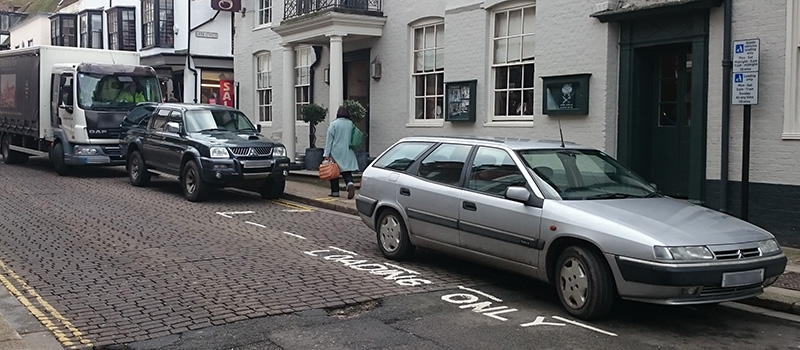
A large car occupies most of what is clearly marked as a loading bay. Another car behind it blocks a delivery lorry. And in nearby Lion Street pavements are cracked and pedestrian lives endangered as deliveries continue to be made to The George Hotel.
The loading bay was meant to provide space for deliveries to The George and prevent the problems that occur in Lion Street by the side of the hotel. This narrow street tends to be the main exit from the historic citadel area at the top of the town because of the sharp corners by Lamb House and from Church Square, and there is no room to pass parked lorries without driving up on to the pavement.
Obviously some shops in Lion Street have no alternative entrances, but The George now has a loading bay specifically introduced for its benefit. But the Lion Street pavements clearly tell a different story.

Paving stones and kerbstones are cracked and damaged (and utility services underneath like gas and water may also be affected) immediately opposite The George’s side entrance. The side entrance contains the old coachyard now used for drinking and dining, while the former garage at the front is also a dining area. And the damage continues for a distance of about the length of two cars north and south of the entrance on the other side of the road.
The loading bay has not stopped lorries (not one or two, but sometimes three) parking there to deliver, often very early in the morning.
The loading bay, initially an experiment, soon ran into trouble though, through misuse, with delivery lorries backed up along the High Street if someone had parked there.
So the problem has not gone away, and a resident (Nick Taylor) and a shopkeeper (The Golden Fleece) opposite The George’s side entrance have asked Rye Town Council for bollards to be put up along that stretch of pavement. A site meeting will be held in the New Year which will include the highways authority, East Sussex County Council.
Nick Taylor, one of the people affected, told the council that the “goods-vehicle loading bay in the High Street has for the most part considerably eased the flow of traffic in the central part of the High Street and in that respect it has been highly successful.
However it has made very little difference to deliveries and services for the George Hotel whose drivers mostly continue to use Lion Street as their stopping point instead of the loading bay.”
Lion Street, the council was told, is in the centre of the town, and at the heart of the tourist district, and therefore has considerable pedestrian usage by people of all ages including large parties of schoolchildren from this country and abroad – as well as wedding parties from the Town Hall or St Mary’s.

Some of the vehicles using Lion Street are very large, up to 22 tonnes, and vehicles mounting the pavement have damaged The Golden Fleece’s shop frontage, while visitors who do not know the dangers may leave the shop unaware of the risks from pavement traffic (see photo at top).
Cars and other vehicles forced to mount the pavement come very close to people’s front doors (see photo, right) and on occasions very large parked vehicles can make it impossible to either get out of, or enter, the front door. So the problem continues.
Photos: Nick Taylor
Image Credits: Nick Taylor .



